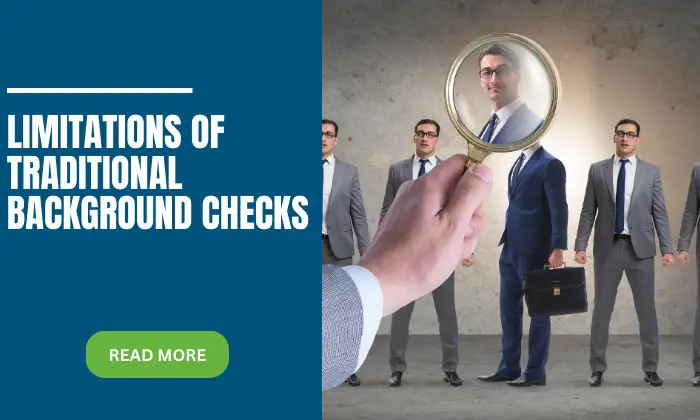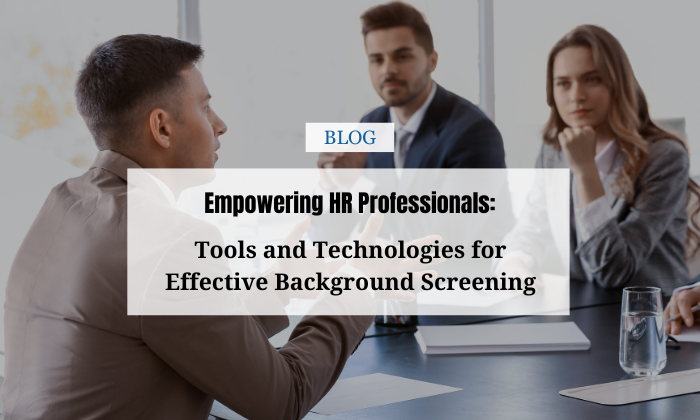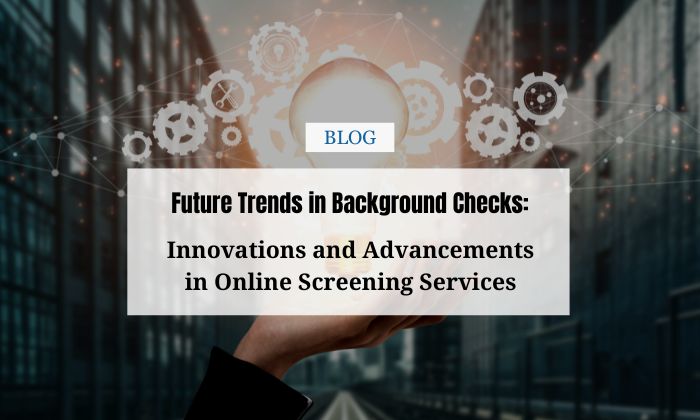In today’s era characterized by a growing dependence on information and data, the role of traditional background checks has gained significant prominence within our decision-making frameworks. Whether applied to matters of employment or rental considerations, these checks serve as a primary layer of assessment when gauging an individual’s appropriateness. Yet, a deeper analysis reveals that as we dig beneath the superficial layer, the conventional methodologies of background checks manifest distinct constraints and shortcomings.
The Facade of Completeness: Incomplete Information
In our strong desire for certainty and trustworthiness, traditional background checks have become like vigilant guards of scrutiny. However, if we look closely, we’ll see a significant limitation: important gaps in the information they provide.
Most usual background checks mainly focus on a person’s criminal history. While this is really important for understanding potential risks, it doesn’t show the bigger picture of a person’s life and character. It’s like trying to understand a complex story from just the beginning, without considering the rest of the chapters that could reveal personal growth, change, and positive contributions.
Imagine this: someone applying for a job who had a small issue in the past. The background check might raise a warning, but it won’t show the later years of hard work to improve, learn new skills, and change their way of thinking. These changes could make the initial mistake seem less important in the grand scheme of things.
Additionally, traditional background checks are stuck in the past and can’t show how a person’s life is changing. Human life is all about change, and within change, there’s room for progress and development. But these checks only look at old information, missing out on the potential for big transformations over time.
When we dig deeper into traditional background checks, it’s clear that they rely too heavily on one thing – criminal history – and this is like trying to understand a beautiful painting by looking at just a tiny part of it. In our quest for accuracy, we forget to see the whole picture of a person’s life journey. It’s time to realize that while these checks are important, they also have limits. In the next sections, we’ll explore the serious consequences of this limit and start to understand why we need a more complete way to understand someone’s story.
The Moral Quandary: Legal and Ethical Boundaries
In our world where information guides decisions and how we see things, traditional background checks have become like reliable guides to knowledge. But, as we look deeper into how these checks work, we find ourselves faced with a complicated mix of legal and ethical questions that need our attention.
At the heart of this challenge is a delicate balance between understanding someone fully and respecting their right to keep things private. Checking into someone’s past, even if we mean well, can sometimes cross personal boundaries. This ethical puzzle is a big one – how can we get important information while still treating each person’s dignity and freedom with care?
More things get complicated when we think about bias. As humans, we naturally make judgments based on what people have done before, which can lead to unfair decisions. The task is figuring out how to tell the difference between real concerns and unfair judgments, creating a system that treats everyone fairly and makes sensible choices while saying no to all types of unfair treatment.
Then there’s the tricky matter of getting permission, which is a big challenge in this process. Making a complete profile often depends on getting someone’s agreement, but getting clear and informed permission isn’t always easy. The situation matters a lot, especially in important situations like job applications, where people might feel pressured to say yes. Making sure that the process of getting permission is clear, fully understood, and willingly given is a big part of making things fair.
As we walk through this complicated situation, it’s getting more obvious that traditional background checks aren’t just about collecting information. Legal rules and ethical ideas shape how we do this, highlighting the tricky balance between wanting important facts and respecting personal rights. In the next parts, we’ll untangle the legal and ethical questions even more, trying to find the right balance that guides traditional background checks.
Beyond the Tip of the Iceberg: Limited Scope
In the world of making important choices, traditional background checks play a big role, like a compass guiding us through new and unfamiliar paths. But as we dig deeper into how these checks work, we start to see some unexplored limits that go beyond what’s on the surface.
Usually, these checks have been mainly used for job decisions. But as the way we work keeps changing a lot, these checks might not fit so well anymore. With more non-traditional jobs, the gig economy, and new career paths, traditional checks can’t handle all the new challenges that come up.
Also, these checks usually focus on one specific situation and don’t always think about other places where they could help a lot. Like checking out people who want to rent a place, finding volunteers, or even looking for partners to start a business with. It seems like traditional background checks aren’t looking at the bigger picture sometimes.
Imagine someone who wants to rent a place and has a great record of helping the community and managing money well. A regular background check might not show these good qualities that go beyond just money stuff.
As we go deeper into this, we can see that the limits of traditional background checks are more than just simple problems. They shape how we understand things, and maybe it’s time to expand how we use these checks to fit all the different decisions we make nowadays. In the next parts, we’ll explore new areas where regular checks might not be enough and come up with ways to deal with these new situations.
The Digital Footprint Paradox: Ignoring Online Presence
In our digital world, where our online activities leave marks everywhere, traditional background checks are really important. But as we look into how these checks work, we notice something interesting: they don’t really pay attention to our online selves.
Usually, these checks focus on the real things from our past – like records of any trouble with the law, our work history, and education. But in today’s world, where we do so much online, this way of looking at things isn’t complete.
With social media, online groups, and other digital stuff, we create a kind of second version of ourselves. This online stuff can show what we care about, how we talk, and even parts of our personality that normal checks don’t see.
Think about someone who looks great on paper for a job, but their online stuff tells a different story – maybe they’ve made choices that don’t match with what a company stands for. If we only look at the regular stuff and ignore the online part, we might make judgments that miss who they really are.
But the online world isn’t just about finding problems. It also shows all the cool stuff we’ve done, how we’re part of a community, and the friends we have. Ignoring this good stuff online is like reading a book and skipping the most exciting parts.
As we explore how background checks work, it’s clear that the online part is really important. It’s not just something we can ignore. In the next parts, we’ll dive deeper into this online world, seeing what happens if we don’t pay attention to it, and finding ways to include it in how we understand people today.
The Dawn of Automation: Technological Advancements
In our changing world driven by technology, the way we do traditional background checks is getting a big update. With the new digital age upon us, automation is becoming a big part of how we screen and make decisions.
Before, people did background checks by going through information and looking for important details. But now, technology is changing things. Complex computer programs, smart data analysis, and artificial intelligence are becoming really important in how we do background checks.
This shift to automation brings lots of promises. It can make things faster and more accurate, and it might even help reduce unfair judgments caused by human mistakes. Computers can quickly go through huge amounts of information to create detailed profiles that would take a really long time to make using the old way.
But as we explore this new way of doing things, we come across some questions. While technology is great, the human touch is still really important, especially for understanding tricky situations that computers might not get right. And we can’t ignore the idea of depending too much on computers, which brings its own set of challenges. We need to figure out how to combine human wisdom with new technology in a smart way.
As we move through this changing world, it’s clear that automation isn’t just about using different tools. It’s like a whole new way of thinking about how we do background checks. In the next parts, we’ll dive deeper into this big change, finding out how people and technology can work together and keeping an eye on any problems that might come up.
Lessons from the Past: High-Profile Failures
In the world of background checks, there are stories that teach us important lessons. These stories show times when regular checks didn’t work well and showed us the limits of the process.
One story that stands out is about a person with a clean background check, but they actually had done things that were morally wrong. This mistake had serious consequences for a group that had trusted the usual methods.
In another story, a respected professional with a good background record actually had a secret history of doing bad things with money. Not looking deeper into this person’s past didn’t just hurt their own reputation, but it also made people question the accuracy of the background check.
These stories are not just isolated incidents. They show us that even the best background check systems can have flaws. This means that we need to be constantly working to improve our background check processes. We need to use a variety of methods, including traditional and innovative approaches.
By studying these failures, we can learn a lot about how to make background checks more effective. We can learn the importance of constantly updating our systems, being flexible, and questioning our assumptions. By understanding the past, we can make better decisions about the future of background checks.
Rethinking the Framework: The Way Forward
Background checks are changing. The old way of doing things is not enough. We need to take a more comprehensive and effective approach.
One important change is to look at the whole person, not just their past. We need to consider their present and future potential as well. We can do this by using real-time updates, ongoing monitoring, and a wider range of data sources.
Another important change is to balance privacy with technology. We need to use technology to improve background checks, but we also need to protect people’s privacy. We can do this by having open conversations about privacy, strong regulations, and ethical considerations.
In the future, background checks will be a combination of human judgment and technology. Technology can help us do things faster and more accurately, but it can’t replace human judgment. We need to use both to make the best decisions.
As we move into the future of background checks, we need to remember the past. We need to learn from our mistakes and build on our successes. We also need to be open to new ideas and new ways of doing things.
Together, we can create a future where background checks are fair, accurate, and reliable. We can use them to protect people and make our world a safer place.
Conclusion
Traditional background checks have limitations. They can be inaccurate, unfair, and violate people’s privacy. We need to find a way to use technology to improve background checks without sacrificing these important values.
One way to do this is to use a balanced approach that blends technology and human judgment. Technology can help us collect and analyze data more quickly and efficiently, but it can’t replace human judgment. We need to use both to make the best decisions.
We also need to be mindful of the legal and ethical considerations involved in background checks. We need to make sure that we are collecting and using data in a way that is fair and respects people’s privacy.
As we move into the future, we need to create a new framework for background checks that is more accurate, fair, and respectful of privacy. We can do this by working together to find solutions that honor both progress and our enduring values.
Securecheck360
At Securecheck360, we specialize in providing comprehensive Employment Background Screening Services to businesses of all sizes, both nationally and internationally. Our tailored solutions are designed to cater to the specific needs of Small, Mid-Size, and Large organizations, ensuring that they have the necessary tools and information to make informed hiring decisions.
To know more about our services, book your free demo today!







